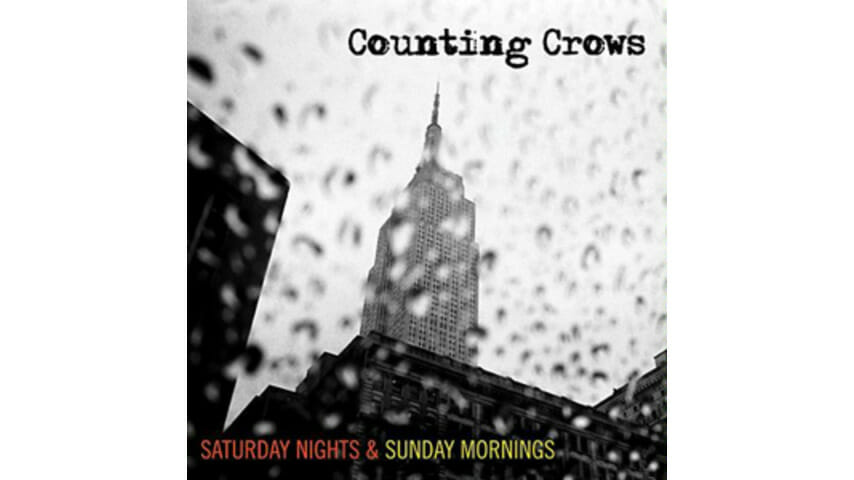
Duritz and Co.’s latest a ghost in the fog
I should’ve seen it coming when the Counting Crows went on a minor-league-baseball-stadium tour with Live. (Yes, minor-league. And, yes, that Live.) A devoted Crows fan, I tried to justify it (Bob Dylan tours stadiums and nobody’s got a problem with him!), but I eventually faced the facts: We’re hardly talking about Dylan here, and opening for a washed-up grunge-pop band at the Blair County Ballpark in Altoona, Pa., can’t really be construed as a good thing.
Counting Crows once occupied a coveted space in their industry: They were a mainstream band with street cred, making solid music and lots of money at the same time, which was no small feat. They exploded on the adult-alternative scene with 1993 hit “Mr. Jones,” a foreshadowing song about fairy-tale dreams of making it big. August and Everything After met with critical acclaim and gained the band thousands of lifelong fans. It’s a near-masterpiece—the lyrics read like poetry, the hooks are huge and T-Bone Burnett’s production is remarkable.
For many, August is the band’s best work, and everything after pales in comparison. But while the themes in 1996’s Recovering the Satellites aren’t as inviting (fame after a nervous breakdown, falling in and out of love after a nervous breakdown, and contemplating the universe after a nervous breakdown), most of the music would fit comfortably on August if it weren’t so electric. As for 1999’s This Desert Life, songs like the disarmingly stark “Colorblind” and the super-catchy “Hanginaround” made the lingering aggression worthwhile.
In 2002 came Hard Candy, a record as poppy as its title suggests. Organic Crows fans were miffed by the syrupy production, the often-predictable melodies and—of course—Vanessa Carlton’s appearance on the radio-single cover of Joni Mitchell’s “Big Yellow Taxi.” But just because music is Top 40-friendly doesn’t mean it sucks—“Holiday in Spain,” “Black And Blue” and “Goodnight L.A.” are traditional Crows slow jams, and Ryan Adams co-wrote and contributed vocals to the waltzy “Butterfly in Reverse.”
Which brings us to date. The band has divided its new record into Saturday Nights (electric-guitar-heavy rockers, fittingly helmed by Gil Norton, who also produced Satellites)—and Sunday Mornings (strummier, whinier, banjo-laden numbers produced by Brian Deck of Modest Mouse/Iron and Wine fame). The plan isn’t executed well enough to be groundbreaking: The fast/slooow/fast sequencing baffles, and sometimes it’s unclear whether you’re listening to Side A or B. Plus, the concept isn’t original. It’s been done before, even recently—by The Foo Fighters (In Your Honor), and by the Counting Crows themselves (Across A Wire: Live in New York).
There are occasional whiffs of classic Crows: when “Cowboys” moves effortlessly from electric frenzy into lilting chorus, in nostalgic lines like “She is the film of a book of the story / Of the smell of her hair” (“On A Tuesday In Amsterdam Long Ago”), and in countless references to shades of darkness and light, the weather, ghosts and California cities. Or better yet, in verses like “I dream of Michelangelo when I’m lying in my bed / I see God upon the ceiling, I see angels overhead” (“When I Dream of Michelangelo”). Sound familiar? That’s because Duritz lifted a line from HIS OWN SONG, “Angels of the Silences.” Some consider these self-referential allusions poetic and thought-provoking—and if the rest of the lyrics were on par with “Angels,” I’d agree—but in this case, it sticks out like a sore thumb down.
Many of the sentiments behind Duritz’s imagery haven’t changed in the last decade either. The tragic insecurity, fear of invisibility, longing for greatness, the fatalistic view of love—it’s all still there. But he used to put it so beautifully, as in the first line of the first song on August, “Round Here”: “Step out the front door like a ghost into the fog / where no one notices the contrast of white on white.” On 1996’s “Have You Seen Me Lately,” that same emotion is phrased a little less poetically, but it’s still striking: “I was out on the radio starting to change / Somewhere out in America, it’s raining / Could you tell me one thing you remember about me?” Now, it’s 2008, and we’ve come to this: “Please won’t you look at me? / Cause I’m not seeing you look at me / Oh, I will make you look at me / or I am not anything.”
Don’t get me wrong—the sentiments aren’t all the same. Some of the very concepts behind Duritz’s lyrics have taken a turn for the careless. We’ve gone from August’s heartbreaking verses regarding women, like “Kindness falls like rain, it washes me away / And Anna begins to change my mind / And every time she sneezes I believe it’s love” (“Anna Begins”), to Saturday’s often trite and decidedly un-poetic lyrics, like “Give me a kiss I think it feels like sunshine / Come on baby light me up / I wanna look into your eyes until I go blind” (from “Sundays”), and “We’re gonna get drunk, find ourselves some skinny girls and go streetwalking, baby” (from “Los Angeles”). Streetwalking? Skinny girls? Seriously?
Granted, on a scale of Celine Dion Live à Paris to OK Computer, this is a fine record. But it’s only fair to consider Saturday Nights, Sunday Mornings in the context of the rest of the Crows’ catalog, and with that in mind—to borrow a phrase from Duritz—this one might fade into the grey.
Click here to read Paste‘s recent interview with Adam Duritz…